

How three conspiracy theorists took 'Q' and sparked Qanon. In November 2017, a small-time YouTube video creator and two moderators of the 4chan website, one of the most extreme message boards on the internet, banded together and plucked out of obscurity an anonymous and cryptic post from the many conspiracy theories that populated the website's message board.
Over the next several months, they would create videos, a Reddit community, a business and an entire mythology based off the 4chan posts of “Q,” the pseudonym of a person claiming to be a high-ranking military officer. The theory they espoused would become Qanon, and it would eventually make its way from those message boards to national media stories and the rallies of President Donald Trump. What are deepfakes – and how can you spot them? What is a deepfake?
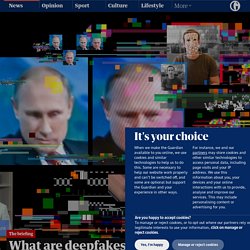
Have you seen Barack Obama call Donald Trump a “complete dipshit”, or Mark Zuckerberg brag about having “total control of billions of people’s stolen data”, or witnessed Jon Snow’s moving apology for the dismal ending to Game of Thrones? Answer yes and you’ve seen a deepfake. The 21st century’s answer to Photoshopping, deepfakes use a form of artificial intelligence called deep learning to make images of fake events, hence the name deepfake. We’re Never Going Back to the 1950s. Like Putnam’s beloved bowling alleys, cinemas are an example of the decline of semiweekly gatherings in the United States—even if they’re less chatty establishments.
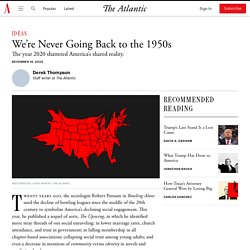
In the 1940s, the average American bought more than 30 movie tickets a year, regularly packing into theaters with scores of strangers. In the past few years, that figure fell below four. In 2020, movie tickets sold per-person will fall below one—possibly for the first time since the late 1800s. The decision by Warner Bros. will likely encourage other entertainment companies, such as Disney, to funnel more of their marquee content to streaming services in the next few years. And the result could be a death spiral for movie theaters as we know them, as the film industry continues its shift from a public, ticketed affair to a private, living-room experience.
Why Social Media Makes Us More Polarized and How to Fix It. Every time I log onto Facebook, I brace myself.
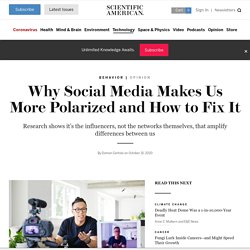
My newsfeed—like everyone else’s I know—is filled with friends, relatives and acquaintances arguing about COVID-19, masks and Trump. Facebook has become a battleground among partisan “echo chambers.” Podcasts : NPR. (1) Social-Media Companies Threaten Democracy. TVs and Phones Trade Inaudible Ultrasonic Signals to Figure Out Who They Belong To. Verizon’s “supercookies”—a snippet of code injected into mobile users’ web requests—silently identify and track its customers, sharing the information with AOL’s wide-reaching ad network.
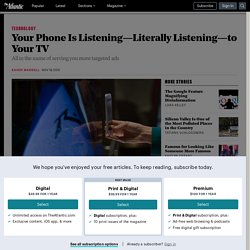
Vizio Smart TVs tie customers’ viewing habits to a home Internet address and sell the information to advertisers. And both programs require customers, who are often unaware of the programs, to opt out of them if they don’t wish to be tracked. But a newer method of cross-device tracking wanders into the realm of science fiction. According to a filing from the Center for Democracy and Technology, a digital human rights and privacy advocacy organization, companies have figured out how to use inaudible sounds to establish links between devices. Here’s how software from SilverPush, a leading provider of “audio beacons,” works: When you visit a website that uses SilverPush tracking technology, the site causes your device to emit an inaudible ultrasonic sound. Media Bias Chart, 3.1 Minor Updates Based on Constructive Feedback - ad fontes media. So why is it time for another update to the Media Bias Chart?
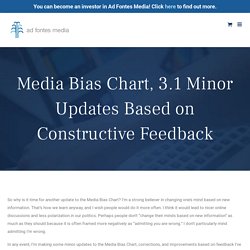
I’m a strong believer in changing one’s mind based on new information. That’s how we learn anyway, and I wish people would do it more often. I think it would lead to nicer online discussions and less polarization in our politics. Perhaps people don’t “change their minds based on new information” as much as they should because it is often framed more negatively as “admitting you are wrong.” Foreign Cyberattack Cripples Major U.S. Newspapers. Christopher Wylie: 'The fashion industry was crucial to the election of Donald Trump' Pulling back the curtain: Wizard of Oz named most influential film. When a tornado carried Dorothy off to a land of witches and talking scarecrows it was not only Oz that she and her companions ended up taking by storm: new research suggests the world of movies was never the same again either.
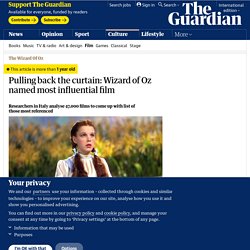
Researchers in Italy have declared the Wizard of Oz the most influential film ever made, outstripping others in how much it has inspired and been referenced in the film industry. The research team came to their conclusion after analysing more than 47,000 films across 26 genres, using references noted in the online movie database IMDb. The authors note that the database is biased towards films from the west, with the majority produced in the US. The team did not consider short films, adult films and those with no link or reference to other movies. “It is exactly the purpose of our research on most significant movies: to find the ones that are important from an historic point of view,” said Dr Livio Bioglio, a co-author of the study, from the University of Turin.
Are You Lost in the World Like Me? click 2x. Macaulay Library – A scientific archive for research, education, and conservation, powered by you. US declines in internet freedom rankings, thanks to net neutrality repeal and fake news. If you need a safe haven on the internet, where the pipes are open and the freedoms are plentiful — you might want to move to Estonia or Iceland.
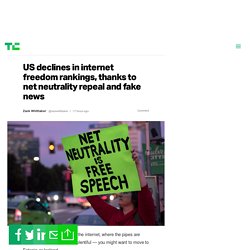
The latest “internet freedoms” rankings are out, courtesy of Freedom House’s annual report into the state of internet freedoms and personal liberties, based on rankings of 65 countries that represent the vast majority of the world’s internet users. Although the U.S. remains firmly in the top 10, it dropped a point on the year earlier after a recent rash of changes to internet regulation and a lack of in the realm of surveillance.
Last year, the U.S. was 21 in the global internet freedom ranking — the lower number, the better a country ranks. That was behind Estonia, Iceland, Canada, Germany and Australia. When television took a stand - Telegraph. Although Murrow is beloved by Americans with longer memories, the amnesia-inducing tendencies of today's pop culture means there are fewer and fewer people around who will be able to recall his achievements.
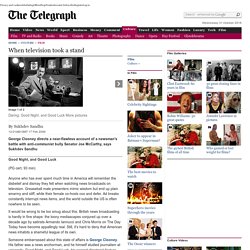
These include his This Is London radio broadcasts during the Second World War, the See It Now series on CBS that covered current affairs with rigour and passion, and the Person to Person series in which he interviewed at length the leading entertainers of the day. Showered with Emmys though these programmes may have been, to most people, not least those outside the US, they mean absolutely nothing today. Clooney and his fellow screenplay writer Grant Heslov could have created a standard biopic.
The Fallen of World War II. Anonymous - The Story of Aaron Swartz Full Documentary. Culture - How Bruce Davidson’s civil rights photos still resonate now. “In order for me to make meaningful photographs, I had to be close,” says Bruce Davidson in this video, part of a series marking the 70th anniversary of Magnum Photos.
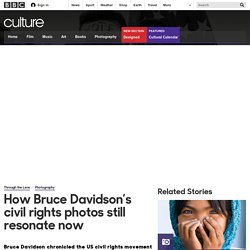
The 84-year-old joined the agency in 1958, and in the early 60s chronicled the civil rights movement in the US. Click on the play button above the story to watch the video. Debating Use. Is This Anderson Cooper Standing in a Ditch While Reporting Hurricane Florence? Photographs document CNN's Anderson Cooper faking the depths of Hurricane Florence floodwaters.
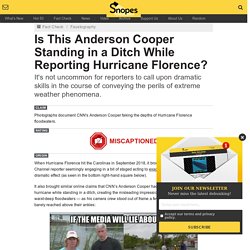
When Hurricane Florence hit the Carolinas in September 2018, it brought the spectacle of a Weather Channel reporter seemingly engaging in a bit of staged acting to exaggerate the strength of winds for dramatic effect (as seen in the bottom right-hand square below). Oldest photographies in the world. Banksy (@thereaIbanksy) Mad Magazine's clout may have faded, but its ethos matters more than ever before. The 5 most influential data visualizations of all time. 1st US Census asked 4 questions click 2x. The Cambridge Analytica scandal is confusing. This timeline will help. Big data for the people: it's time to take it back from our tech overlords. Google knows you’re pregnant. Spotify knows your favorite throwback jams.
How biased is your news source? You probably won’t agree with this chart. Are we even aware of our biases anymore? If you look at this chart and are convinced your “extreme” source belongs in the middle, you just might be part of the problem plaguing America today. “In the past, national evening news programs, local evening news programs, and the front pages of print newspapers were dominated by fact-reporting stories,” says the chart’s creator, patent attorney Vanessa Otero.
“Now, however, many sources people consider to be ‘news sources’ are actually dominated by analysis and opinion pieces.” Most frequently used words in Trump tweets [OC] : dataisbeautiful. Facebook (FB) is using an old drug dealer tactic to keep its users hooked to News Feed. Namibian-German negotiations about the genocide perpetrated in the former German colony South West Africa in 1904-1908 have just entered their third year. Gifs: 30 years of reactions, dancing babies and popcorn click 2x. Torching the Modern-Day Library of Alexandria. You were going to get one-click access to the full text of nearly every book that’s ever been published. Books still in print you’d have to pay for, but everything else—a collection slated to grow larger than the holdings at the Library of Congress, Harvard, the University of Michigan, at any of the great national libraries of Europe—would have been available for free at terminals that were going to be placed in every local library that wanted one.
Visual Literacy: Photoshop and More. Free Philip K. Dick: Download 13 Great Science Fiction Stories. Although he died when he was only 53 years old, Philip K. Dick (1928 – 1982) published 44 novels and 121 short stories during his lifetime and solidified his position as arguably the most literary of science fiction writers. Agoraphobic Traveller pictures from Street View. Facebook Addiction - New Psychological Scale. False, Misleading, Clickbait-y, and Satirical “News” Sources. Experience in WebVR - The Glass Room. 'Our minds can be hijacked': the tech insiders who fear a smartphone dystopia.
Justin Rosenstein had tweaked his laptop’s operating system to block Reddit, banned himself from Snapchat, which he compares to heroin, and imposed limits on his use of Facebook. But even that wasn’t enough. Google’s featured snippets are worse than fake news. Top Grossing Actors of All Time - Click 2x. A Marshall McLuhan expert annotates the Google Doodle honoring the internet visionary — Quartz.
How To Download All The Data That Google Has On You. Real investigative reporting still exists (2x) How Facebook flouts Holocaust denial laws except where it fears being sued.